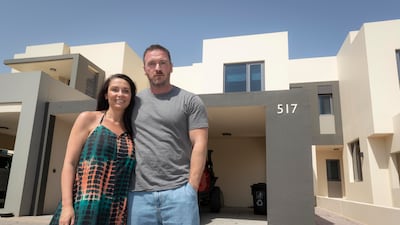Rogue landlords in Dubai are attempting to raise rental prices by several times the legal limit set by the authorities, residents and real estate experts said.
There are examples of owners telling tenants they must pay a 50 per cent hike to renew their contract, or vacate the property.
Dubai Land Department’s Real Estate Regulatory Authority (Rera) has clear rules for landlords and tenants.
The demands by some landlords are in violation of government rent control rules and tenants' rights.
Engel & Volkers
Market prices for villas in communities such as Dubai Hills and Damac Hills have risen by as much as 50 per cent in recent years. In a booming market, rules are being ignored by owners who hope to cash in.
Now, tenants are increasingly filing complaint cases against rogue landlords. If found at fault, landlords could have to hand over thousands of dirhams in compensation to their tenant.
A Rera rental increase calculator gives an average price indication for tenants of what they should expect to pay and how much landlords can increase renewals.
Rental increases are capped at 20 per cent per year, depending on market price changes in a given area.
Billy Garnon, from Ireland, lives with his wife Terri in Dubai Hills, where some rents have doubled since 2019.
“A lot of our neighbours have been affected by this, forced out of their homes and now they are left empty as people don’t want to pay these inflated rent prices,” he said.
“There are at least 12 villas near to us that are now empty and have been for a couple of months.
“We’ve only been here for a year and, after a conversation with our landlord, he was reasonable to only raise our rent by Dh10,000.
“Others are in a worse situation, with some landlords increasing rent by Dh50,000 or more.
“Landlords need to be careful, as some areas are becoming ghost towns which makes it difficult to build a community.”
With Dubai's population likely to increase from 3.3 million to 5.8 million by 2040, there are major developments planned.
Under the Dubai 2040 Urban Master Plan, development and investment will be focused on five main urban areas — two of the areas will be new and the other three will be revitalised.
Each will look to develop vibrant and inclusive communities that include the doubling of green and leisure areas.
Despite a surge in demand for properties, particularly villas when residents wanted more space during the onset of the coronavirus pandemic, landlords are restricted by law on how much they can increase the rent each year.
Law is there to protect tenants
Mario Volpi, sales and leasing manager at Engel & Volkers and a property columnist for The National, said rent increases are based on the Rera calculator.
“Since 2014, rent prices and sale prices have been falling in Dubai,” he said.
“A recovery happened in 2020 but was delayed because of the pandemic.
“It has been a perfect storm. People are coming to Dubai as a safe haven, particularly from Russia and Ukraine.
“This influx of people has created a false market, with the number of people wanting property here higher than what would have been the case.”
Tenants can only be evicted from their home if a landlord wishes to sell, if they or a family member wishes to move in, if the landlord wants to conduct extensive renovations that will render the property unlivable or wishes to demolish the property.
Written approvals from authorities are required to confirm a property needs to be vacated entirely for work to proceed.
Mr Volpi said landlords have been known to ask tenants to leave, claiming they plan to move in themselves, only to remarket the property at a higher rent.
“It does happen and the evicted tenant will rarely challenge this as they have often moved on,” he said.

“Tenants have the right to ask to move back in again, but landlords will often re-let the vacant property and ask for a lot more money.
“If your landlord is raising the rent higher than the stated amount, and if a tenant can’t agree on a price, an arbitrator at the rent committee is the only option.
“There is compensation available for evicted tenants whose landlord goes on to rent the property at a higher rate.
“The law is there to protect tenants and stop landlords getting people out of their homes just because of a rising market.”
Legal notices pinned to doors
According to the Dubai Land Department (DLD), landlords must provide 90 days' notice regarding any changes to the rent contract, such as breaking it or increasing the rent amount.
Tenants can legally refuse a rental amount increase if 90 days' notice was not provided by the landlord.
The tenant can file a case with the Rent Disputes Settlement Centre at the DLD upon refusing to agree to the new terms of the contract.
Anyone opening a case at the rental committee must pay 3.5 per cent of the rental amount.
The winning party usually has costs awarded to them, although this is not guaranteed.
Paragon Properties
Once a contract is agreed upon, it must be registered with Ejari — Rera's online portal — as soon as possible to protect tenants and landlords.
South African Dean Charter, managing partner of Paragon Properties, said some landlords will leave a property empty and wait for a higher price.
“Pre-Covid, a Dubai Hills villa that would rent for Dh180,000 is now going for Dh300,000,” he said.
“Legally, landlords can only increase by 20 per cent a year, so they are asking well above what the Rera calculator says.
“A lot of new agents are coming here to operate, and with so little stock available it creates an inflated market.
“Some landlords are happy to keep a property empty for a period of time to capitalise on rising market rates, but it is a risk.
“Normally, a vacant villa is either associated with a problem with the building or a greedy landlord.”
After repeated rent rises or eviction notices, some have chosen to abandon the rental market.
One of those is Kirsty Sweeney, from Ayrshire in Scotland, who is leaving Damac Hills after three years because of surging rents and buying in Green Community.
“A lot of our neighbours in Damac Hills were getting similar notifications from landlords, asking them to move out or having legal notices placed on their doors giving them 12 months to vacate,” she said.
“No one was doing the proper checks and balances, like asking for proper legal notification as they were unaware of the law, so just moved out.
“Some of these houses in Damac Hills are still empty, 10 months later.
“The price increases were huge, with agents contacting owners to say they could get significantly more for their properties.”





















